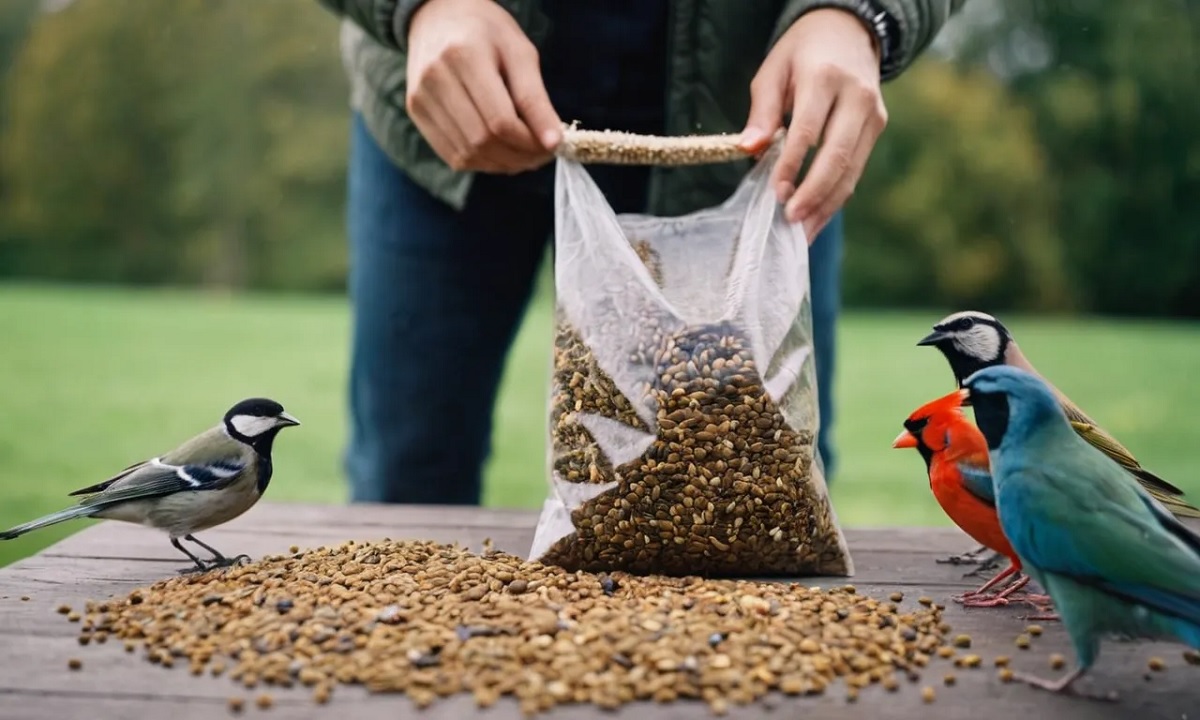Hearing birds chirping is often a pleasant experience, but constant noise from certain species can quickly become a daily disturbance. Whether it’s early morning wake-up calls or non-stop chirping near your windows, many homeowners and apartment dwellers face this exact issue. Understanding how to get rid of annoying chirping birds without harming them is important for maintaining both peace and ethical wildlife practices. These birds are often drawn to food sources, nesting spots, or safe perches around your property.
By identifying what attracts them and using humane deterrents, you can reduce their presence significantly. From visual repellents and sound devices to changes in lighting and landscaping, several effective methods can help you create an environment that’s less appealing to noisy birds. This guide will walk you through practical steps and tools that can help you enjoy a quieter, more peaceful space without disrupting local bird populations.
Identify the Source of the Chirping
Before taking any steps to deter noisy birds, it’s important to identify exactly where the chirping is coming from. Pinpointing the source will help you understand which birds are causing the disturbance, why they’re there, and what methods will work best to discourage them. Some birds are seasonal visitors, while others may have built nests nearby, making the problem more persistent.
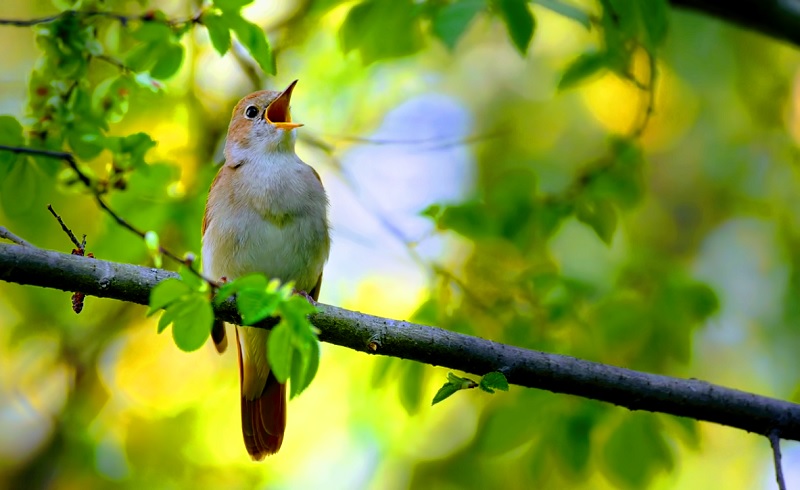
Observe the Time and Pattern of the Noise
Start by paying attention to when the chirping occurs. Is it early in the morning, throughout the day, or mostly at night? Early-morning chirping is usually caused by small songbirds like sparrows, finches, or starlings. Nighttime chirping, on the other hand, could point to nocturnal birds like mockingbirds or nightjars. Noting the time and duration of the chirping helps you understand whether it’s a nesting issue or just temporary activity during certain hours.
Look Around Windows, Rooflines, and Trees
Chirping birds tend to perch or nest in high, sheltered areas. Check common places such as roof gutters, window ledges, air conditioning units, trees near the home, and even chimney vents. You may notice droppings, twigs, or feathers indicating a nesting spot. Identifying these zones is essential so you can target your bird deterrents effectively. Birds nesting close to homes are more likely to chirp frequently due to nearby food sources and safety.
Identify the Bird Species
Try to identify the bird species based on sound, size, and appearance. Some birds are protected by law, so understanding what species you’re dealing with is important before using any deterrent method. Use a birding app or online guide to help with quick identification. Knowing the species also gives you insight into its habits, such as what attracts it and how it reacts to visual or audio deterrents.
Humane Methods to Deter Chirping Birds
When chirping birds become more of a nuisance than a natural delight, there are several humane ways to encourage them to move elsewhere without causing harm. Using non-lethal deterrents helps maintain ecological balance while also restoring peace to your home environment. These solutions focus on making your property less inviting to birds by targeting their preferred perching, feeding, and nesting areas.
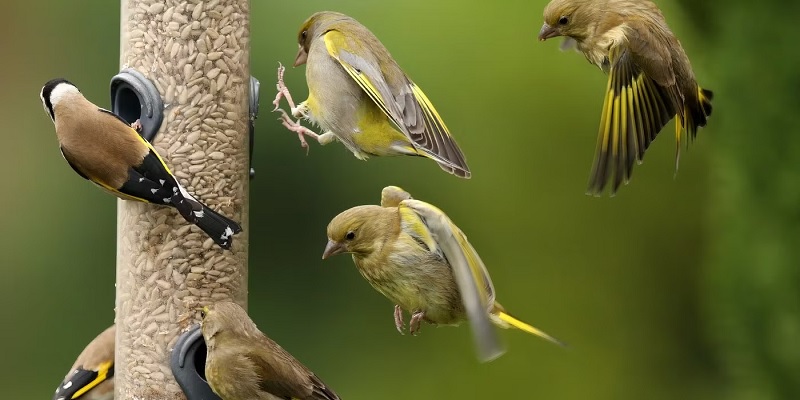
Use Visual Deterrents
Birds are naturally wary of shiny or moving objects. Hanging reflective tape, old CDs, or aluminum foil strips in trees or near windows can discourage them from settling. Bird scare balloons with large eye-like patterns or plastic predator decoys like owls and hawks also work well when moved regularly to prevent birds from getting used to them. Wind chimes with reflective parts add both sound and movement, creating a mild but effective deterrent.
Install Noise-Based Deterrents
Birds often avoid unfamiliar or threatening sounds. Ultrasonic bird repellers emit high-frequency sounds that are uncomfortable for birds but inaudible to humans. Motion-activated sound devices that mimic predator calls or distress signals can also help keep chirping birds at bay. It’s best to rotate these sounds occasionally to prevent birds from adapting to a specific pattern.
Modify Landscaping and Nesting Areas
Trimming back tree branches and dense shrubs removes potential nesting sites and makes birds feel less secure. Covering fruit trees and vegetable gardens with netting prevents birds from feeding, which is a common reason they linger. Placing bird spikes or sloped ledge guards on popular roosting areas such as balconies, window sills, and gutters can also discourage perching and nesting without harming the birds.
Limit Food and Water Sources
Easily accessible food and water will always attract birds. Remove bird feeders temporarily or clean up spilled seeds regularly. Keep pet food indoors and secure garbage lids tightly. Cover standing water sources such as birdbaths and pet bowls when not in use. Without a steady supply of food and water, birds will likely relocate to a more suitable environment.
Physical Barriers and Modifications
Creating physical barriers is one of the most effective ways to prevent chirping birds from nesting or roosting around your home. These methods work by making your space less accessible or comfortable for birds, encouraging them to find other locations without causing harm.
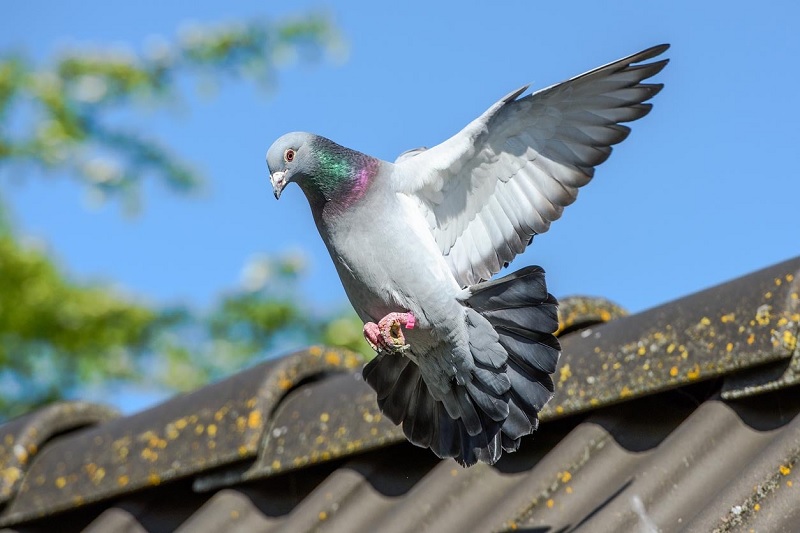
Install Bird Spikes and Netting
Bird spikes are commonly used to deter birds from landing on ledges, fences, gutters, and window sills. They are not harmful but make it difficult for birds to perch comfortably. These spikes are especially useful in urban areas where birds often gather on buildings and rooftops. Bird netting is another effective solution for larger areas like balconies, gardens, or under eaves. It prevents birds from entering or nesting in protected zones.
Use Slope Covers and Ledge Modifications
Sloping covers or angled ledge guards make flat surfaces less desirable for birds to land on. These can be added to window sills, signboards, or any area where birds tend to settle. The steep angle discourages perching without causing harm.
Seal Entry Points
Inspect your home for small openings in vents, chimneys, or roof gaps where birds may enter to nest. Use mesh screens, vent covers, or sealants to block these access points. Preventing entry not only keeps birds out but also avoids future noise and nesting problems. Regular maintenance ensures these barriers remain effective over time.
Natural Remedies and DIY Solutions
When dealing with annoying chirping birds, sometimes the most effective solutions are simple and natural. Using items you already have at home, you can create safe and eco-friendly deterrents to reduce bird activity without harming them. These natural remedies and DIY solutions are ideal for homeowners looking for a low-cost and humane approach.
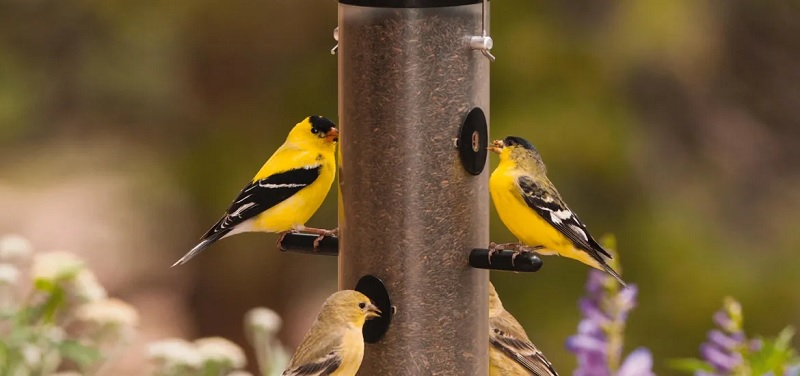
Citrus Peels and Essential Oils
Many birds dislike strong smells, particularly citrus. Scattering lemon or orange peels near windowsills, balconies, or other bird-prone areas can help drive them away. You can also mix a few drops of citrus essential oil (like lemon or orange) with water in a spray bottle and mist it around nesting or perching zones. The strong scent can act as a natural repellent while leaving your space smelling fresh.
Vinegar Spray
A homemade vinegar spray is another easy option. Mix equal parts of white vinegar and water in a spray bottle, and apply it to areas where birds frequently gather. While harmless, the strong odor often discourages birds from returning. Be careful not to overuse it near plants, as vinegar can affect growth.
Homemade Reflective Items
Birds are wary of sudden flashes of light. You can create your own deterrents using household items like old CDs, aluminum foil strips, or mirrors. Hang them near windows, in trees, or along fences where birds tend to perch. The light reflections and movement can make the area feel unsafe to birds.
Wind Chimes with Movement
Wind chimes that include moving or reflective parts can create both sound and motion, deterring birds naturally. These are especially useful near porches or balconies, blending function with a decorative touch.
When to Call a Professional
While many chirping bird problems can be managed with DIY solutions, there are times when professional help is necessary. Knowing when to involve an expert can save you time, protect your property, and ensure the birds are handled humanely and legally.
Birds Nesting in Vents or Attics
If you discover birds nesting inside chimneys, vents, roofs, or attics, it’s best to call a professional. These areas are difficult to access and removing nests without proper training can be dangerous or even illegal, especially for protected species. Experts know how to remove birds safely and seal off entry points to prevent them from returning.
Persistent or Aggressive Bird Activity
When noise and bird presence continue despite using repellents or barriers, professionals can assess the problem more thoroughly. Some birds are territorial and may return season after season. A bird control expert can install advanced deterrents like netting systems or shock tracks that are safe and effective.
Health and Property Concerns
Large accumulations of droppings, foul odors, or visible damage to your home are clear signs it’s time to seek help. Professionals have the right tools to clean and disinfect affected areas, minimizing health risks and restoring your space quickly. Their knowledge ensures long-term, humane solutions that go beyond temporary fixes.
What Not to Do (Avoid Harmful Practices)
When dealing with chirping birds, it’s important to avoid harmful or illegal methods that can injure wildlife or cause long-term problems. Using humane and safe techniques protects both you and the birds while effectively addressing the nuisance.
Don’t Use Poison or Toxic Substances
Never use poisons, chemicals, or harmful sprays to get rid of birds. These substances can cause unnecessary suffering and may also harm pets, children, or beneficial wildlife. Poisoning birds is illegal in many areas and can lead to serious legal consequences.
Avoid Trapping or Killing Birds
Trapping, injuring, or killing birds is not only cruel but often against the law. Many bird species are protected by wildlife regulations, and harming them can result in hefty fines or penalties. Instead, focus on humane deterrents and exclusion techniques.
Don’t Destroy Active Nests
Removing or destroying nests while eggs or chicks are present can cause distress and disrupt the birds’ breeding cycle. It may also be illegal to disturb nesting birds during certain seasons. Wait until the nesting period is over before removing nests or consult a professional for guidance.
Avoid Loud or Continuous Noise Devices
Constant loud noises or scare tactics can stress birds and neighbors alike. Overusing such devices may also cause birds to become accustomed, reducing their effectiveness. Use sound deterrents sparingly and combine them with other humane methods for best results.
Preventing Future Bird Problems
Preventing birds from becoming a recurring nuisance involves a combination of maintenance, habitat modification, and consistent deterrent use. Taking these steps early can save you time and frustration later while keeping birds safely at a distance.
Maintain Your Property Regularly
Regular upkeep plays a crucial role in prevention. Trim tree branches and shrubs close to your house to remove potential nesting and roosting spots. Inspect your roof, gutters, vents, and eaves for gaps or openings where birds could enter or nest. Sealing these access points limits opportunities for birds to settle near your home.
Remove Attractants
Food and water sources are major draws for birds. Clean up any spilled birdseed, secure trash bins, and avoid leaving pet food outdoors. Eliminate standing water by covering birdbaths or draining puddles around your property when not in use. Without easy access to food and water, birds are less likely to frequent your space.
Use Deterrents Consistently
Keep deterrents like reflective tapes, bird spikes, or motion-activated sound devices in place and rotate them periodically. Birds can get used to static deterrents over time, so changing their position or type helps maintain effectiveness. Consistency sends a clear message that your property is not a safe or comfortable spot for birds.
Thoughtful Landscaping Choices
Choose plants that are less appealing to birds or avoid dense vegetation near your home. Using bird netting on fruit trees and garden areas prevents birds from feeding and nesting there, reducing their motivation to stay.
Frequently Asked Questions
How Can I Identify Which Birds Are Causing the Chirping?
To identify the birds causing annoying chirping, observe the time of day and location where the noise is loudest. Early morning chirping often comes from songbirds like sparrows or finches, while nighttime sounds may be from species like mockingbirds. Look around trees, rooflines, vents, and window ledges for nests or perching spots. Using a bird identification app or online guide can help you match the bird calls and appearances to specific species, so you can choose the most effective deterrent methods.
What Are Some Humane Ways to Stop Birds From Chirping Near My Home?
You can use several humane methods to reduce bird chirping, such as installing reflective objects like old CDs or aluminum strips that create flashes of light to scare birds away. Motion-activated sound devices that emit predator calls or ultrasonic frequencies are also effective. Keeping your property clean, trimming trees, and removing food or water sources helps make the area less attractive to birds. Bird spikes and netting prevent birds from perching or nesting in common spots without causing them harm.
Are There Natural Remedies That Help Reduce Bird Chirping?
Yes, natural remedies like scattering citrus peels or spraying diluted citrus essential oils can deter birds because they dislike strong citrus smells. Vinegar sprays applied near perches or nesting areas also work as a safe, natural repellent. Additionally, homemade reflective items such as hanging foil strips or old CDs create light flashes that birds avoid. Wind chimes with moving parts add sound and movement, making your space less inviting to chirping birds.
Can I Use Sound Devices to Keep Birds Away, and Are They Safe?
Sound devices can be an effective way to deter birds by playing predator calls or ultrasonic sounds. These devices are generally safe for humans and pets when used as directed. However, it’s important to rotate the sounds or use motion-activated options to prevent birds from becoming accustomed to them. Avoid continuous loud noises that could disturb your neighbors or cause unnecessary stress to wildlife.
How Do Physical Barriers Help in Preventing Bird Chirping?
Physical barriers such as bird spikes, netting, and angled ledge covers prevent birds from landing or nesting in specific areas around your home. Bird spikes make it uncomfortable for birds to perch without causing injury. Netting can block access to larger spaces like balconies or gardens, effectively reducing nesting opportunities. Sealing vents, chimneys, and roof gaps stops birds from entering sheltered spots where they tend to roost and chirp.
When Should I Consider Calling a Professional to Remove Birds?
You should call a professional if birds have nested inside hard-to-reach places like attics, chimneys, or vents, especially if the species is protected by law. Persistent bird noise or damage that doesn’t improve with home methods also warrants expert help. Professionals can safely remove birds, clean affected areas, and install exclusion devices while complying with local regulations. They can also address health hazards related to bird droppings and nesting materials.
What Are Common Mistakes to Avoid When Trying to Get Rid of Chirping Birds?
Avoid using poisons or harmful chemicals, as these can cause unnecessary suffering and pose risks to pets and the environment. Don’t trap or kill birds, especially protected species, since this is often illegal. Avoid destroying nests while eggs or chicks are present, which can disrupt breeding cycles and violate wildlife laws. Also, don’t rely solely on loud, continuous noise devices, as birds can become habituated and neighbors may be disturbed. Using humane, multi-faceted approaches works best for long-term results.
Final Words
Dealing with annoying chirping birds requires a thoughtful and humane approach to restore peace without harming wildlife. By identifying the source of the chirping and understanding the bird species involved, you can choose the most effective deterrents. Using a combination of natural remedies, physical barriers, and sound devices helps create an environment that discourages birds from nesting or perching near your home.
Avoid harmful practices like poisoning or nest destruction to protect both the birds and yourself. When problems persist or become hazardous, seeking professional assistance ensures safe and legal removal. With patience and the right strategies, you can enjoy a quieter living space while respecting nature and maintaining a healthy balance around your property.
